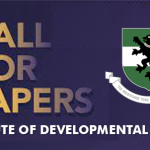2022 INTERNATIONAL ACADEMIC CONFERENCE, THESIS DEVELOPMENT SEMINAR, HOME-COMING AND LAUNCH OF THE DEVELOPMENT STUDIES PROFESSIONALS ASSOCIATION OF NIGERIA
ORGANISED BY THE INSTITUTE FOR DEVELOPMENT STUDIES (IDS)
UNIVERSITY OF NIGERIA ENUGU CAMPUS
Theme
The Africa We Want: Exploring the Path to Self-sufficiency, Competiveness and Home-Grown Development
Date
12-14th July 2022
Venue
CBN Centre for Economics and Finance, University of Nigeria, Enugu Campus
Time
9 am – 6 pm each day
BACKGROUND
Africa has enormous potentials, given the human and material resources the continent is endowed with. The demographic composition of the continent is an asset, with the youth constituting over 60% of the continent’s population. As of 2015, Africa accounted for 19% of total youth population in the world and is projected to account for 42% of world’s youth population by 2030. The teeming youth population implies that the continent would harness demographic dividends, if it invests in the youth.
What is more? Sixty percent of world’s arable land is in Africa. Yet, the continent remains a net importer of food and afflicted by hunger, disease and poverty. Africa is home to the largest number of poor people, accounting for two-thirds of the world’s extreme poor population. As of 2018, an estimated 433 million (or 40 percent) of Africans live below the US$1.90-a-day poverty line.
The situation of youth unemployment, hunger and poverty interacts with violent conflict and governance deficit across the continent, making the problem complex and grossly undermining the possibilities of African development. The 2020 Index of African Governance revealed that in 2019 the African average governance score declined for the first time over the decade. The report notes that “countries have shown concerning declines in Participation, Rights & Inclusion (-1.4) and Security & Rule of Law (-0.7). Here, a deteriorating security situation and an increasingly precarious environment for human rights and civic participation are the primary drivers.”
Meanwhile, with an estimated population of size of 2 billion by 2050, and contemporary challenges posed by the COVID-19 pandemic, which have further weakened fragile economies and retrogressed development in some sectors, there is the need to bring to the front burner conversation on the path to self-sufficiency for African countries, increased competiveness of African economies and strategies for home grown development that would translate to the Africa We Want by 2063.
Various continental initiatives have been enunciated to address the complex challenges facing Africa and put the continent on the path of self-sufficiency while also making its economy competitive in the global political economy. More recently the African Continental Free Trade Agreement (AfCFTA) was launched by Africans. The AfCFTA is said to be the largest trade agreement to take effect since the establishment of the World Trade Organization (WTO). Experts argue that AfCFTA holds tremendous potentials for Africa’s development. For instance, it is estimated that implementing the AfCFTA will increase the volume of intra-African trade by 81% by 2035, and increase the volume of total African exports by29%. Similarly, in January 2015, the Africa Agenda 2063 – The Africa We Want, was adopted as the basis for Africa’s long-term socio-economic and integrative transformation. The Agenda 2063 is in line with the Pan African vision of an integrated, prosperous and peaceful Africa, driven by its own citizens, representing a dynamic force in the international arena to which the African Union (AU) rededicated herself on the occasion of the golden jubilee in May 2013.
However, the key questions remain inter alia: What are the threats to actualization in the Africa we want and the potentials of AfCFTA? How can Africa utilize existing continental platforms and agreements as springboards for actualization of self-sufficient, competitive economy with homegrown development?
SUB-THEMES/TRACKS
Against this backdrop, the IDS2022 International Conference aims to gather over 300 eminent scholars, academics, practitioners, operators of civil society organizations, and policy makers on the following Sub-themes/Tracks:
- The African Continental Free Trade Area (AfCFTA) Agreement as a vehicle for economic development in Africa.
- Opportunities and threats to actualization of the Africa Agenda 2063.
- Tapping the emerging technologies to actualize the Africa Agenda 2063
- COVID-19 Pandemic and the Africa we want: Implications, threats and opportunities.
- Rethinking the challenge of regional integration to Africa’s development.
- Good financial governance (GfG) and Africa’s development.
- Illicit financial flows (IFFs) and the challenge of insecurity in Africa.
- The potentials of women and young people in Africa’s development.
- South-South and Triangular Cooperation (SSC/TRC) and its importance to Africa’s development.
- Governance deficit, violent conflicts and self-sufficiency in Africa.
CALL FOR ABSTRACT
Abstractsof papers for presentation are invited on the sub-themes/tracks. The abstract should be in British English, Time New Romans, font-size 12, single line spaced, not more than 300 words, and include study motive, objectives, methods, results and recommendations. Study title and author/s name/s, affiliation/s and contacts (mobile # and email address) are required.
Abstract submission: Email: ids.2022intconf@unn.edu.ng Deadline: June 30, 2022. Mobile: +234-803-338-7472
Notification of acceptance of abstracton rolling basis – 2nd July 2022
Mode of paper presentation: Hybrid participation (virtual and physical).
Certification:E-copy of certificate will be issued for participation and/or paper presentation.
Book of abstract and conference programme: E-copy to be produced and distributed online to registered participants.
Registration fees, discount and mode of payment
Conference: (1) International participant $100; (2) Academic/Practitioner:N20,000; (2) Student: N10,000;Non-academic staff N5,000.Early-bird registration deadline (10% discount): 30 May 2022.
Account Details:SWIFT CODE: UNAFNGLA. BANK: United Bank for Africa (UBA). ACCOUNT NAME: IDS 2022 International Conference. ACCOUNT NO.: 2240513207.
Opportunity for publication of presented papers in international reputable journal
Presented papers of excellent quality will be considered for acceptance and publishing in the IDS reputable international journal, The Nigerian Journal of Development Studies, at no extra cost (APC-free).
Further enquiries on submitting an abstract, registration and more please call or WhatsApp
08034738615
08033387472
08035516721
Dr. Chuke Nwude Prof. O.C. Eneh Dr. Nkechi Nkwonta
Director, IDS Chairman, LOC Secretary, LOC


